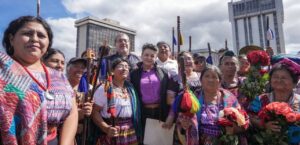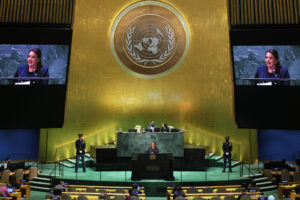This Saturday, negotiations will resume in Costa Rica regarding the constitutional crisis in Honduras. The negotiations are at a critical stage, with President Zelaya vowing to return to Honduras if an agreement is not reached this weekend. International pressure on all parties prior to these talks is vital to ensure that constitutional order is restored, that President Zelaya is reinstated and violence is prevented. WOLA joins OAS Secretary General in his optimism for the upcoming conversations.
In the view of Joy Olson, WOLA Executive Director, “If negotiations this weekend do not yield an agreement that includes the restoration of President Zelaya, the United States should suspend the Millennium Challenge Account (MCC) funds to the de facto Government of Honduras.”
The US has already suspended military aid and other US assistance that goes directly to the Honduran government. MCC funding is contingent on a recipient government’s compliance with certain indicators such as civil liberties, political rights and democratic processes. MCC funds were withheld from Nicaragua last year after the November elections appeared to be severely compromised. The United States must do the same in Honduras.
In addition, WOLA continues to be concerned about the on going violations of human rights since the coup occurred. Yesterday, the Committee of Families of the Detained and Disappeared of Honduras (COFADEH) released its report documenting incidents of human rights violations in the last seventeen days including over a thousand unlawful detentions (primarily of peaceful demonstrators), press censorship and threats and attacks against family members of Cabinet officials in the Zelaya government. The de facto government has also reinstated the curfew, suspending a number of civil liberties. WOLA condemns all acts of violence and calls on the acting government to respect human rights.
The democratic crisis in Honduras goes far beyond this immediate crisis of constitutional order. Honduras transitioned from a military controlled government to a civilian government in the early 1980s, a critical step to establishing electoral democracy. Nevertheless, this transition did not make the political party system in Honduras more broadly representative, and did little to reduce the entrenched poverty and inequality that has made Honduras one of the poorest countries in the Western Hemisphere. “The Honduran people are clamoring for change,” said Olson. “Once constitutional order is restored, we encourage Hondurans to design and implement a process, with the support of the international community, that will address these fundamental issues.”
Contact:
(202) 797-2171
Maureen Meyer, Associate on Mexico and Central America, mmeyer@wola.org,
or
Vicki Gass, Senior Associate on Rights and Development, vgass@wola.org.


